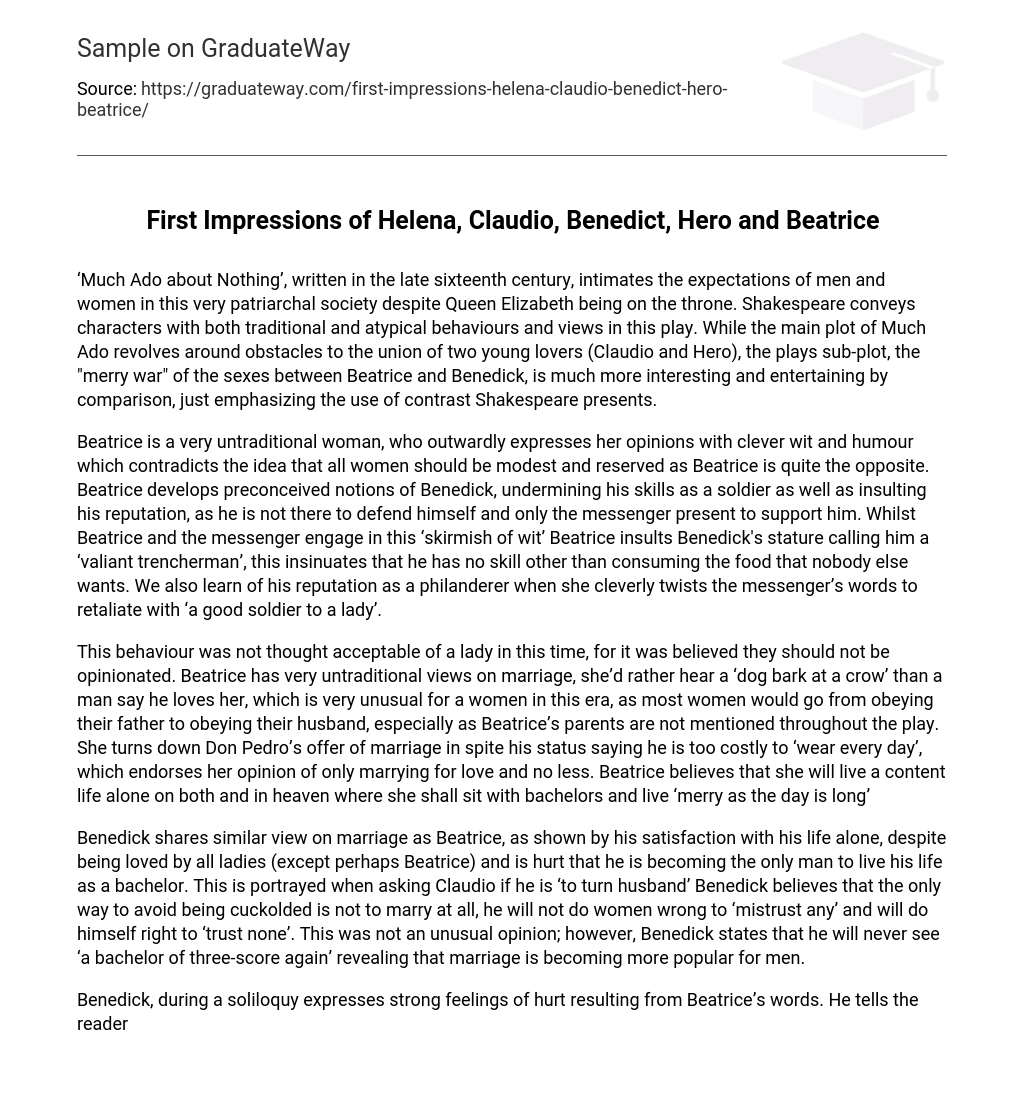In the late sixteenth century, Shakespeare’s play ‘Much Ado about Nothing’ reflects the societal norms and expectations of men and women in a patriarchal society, despite Queen Elizabeth’s reign. The characters in the play exhibit both traditional and unconventional behaviors and perspectives. Although the main storyline focuses on the obstacles that Claudio and Hero face in their union, the subplot highlights the entertaining “merry war” between Beatrice and Benedick, showcasing Shakespeare’s skillful use of contrast.
Beatrice is an unconventional woman who openly expresses her opinions with clever wit and humor, contradicting the expectation for women to be modest and reserved. She forms prejudiced opinions of Benedick, undermining his abilities as a soldier and insulting his reputation, as he is not present to defend himself and only the messenger is there to support him. During their banter, Beatrice mocks Benedick’s stature by referring to him as a “valiant trencherman,” suggesting that he excels only in consuming unwanted food. She also cunningly twists the messenger’s words to accuse Benedick of being a philanderer, responding with “a good soldier to a lady.”
During this time period, it was not considered appropriate for a lady to exhibit such behavior, as women were expected to be submissive and not have strong opinions. However, Beatrice holds unconventional views on marriage. She prefers to hear a ‘dog bark at a crow’ rather than a man declaring his love for her, which sets her apart from other women of that era. Most women would transition from obeying their father to obeying their husband, but Beatrice’s parents are not mentioned in the play. Despite Don Pedro’s high status, she rejects his marriage proposal, stating that he is too expensive to be with every day. This reinforces her belief that marriage should be based solely on love. Beatrice believes that she can live a happy life without a partner, both on earth and in heaven, where she will be surrounded by unmarried men and enjoy a cheerful existence.
Benedick holds the same perspective as Beatrice regarding marriage, as evidenced by his contentment with being single, despite being admired by all women (except, perhaps, Beatrice). He feels hurt that he is becoming the only remaining bachelor and expresses this when he questions Claudio if he is “to turn husband.” Benedick believes that the only way to avoid being cheated on is to abstain from marriage altogether. He refuses to harm any women by mistrusting them and believes it is right for him to trust none. This viewpoint was not uncommon; however, Benedick declares that he will never witness another unmarried man past the age of sixty, indicating a rising popularity of marriage among men.
During a soliloquy, Benedick expresses deep hurt caused by Beatrice’s words. He compares her insults to daggers that stab him with every word, conveying the immense pain he feels. This also highlights how much Benedick values Beatrice’s opinion of him, as her words have such a profound impact on him. He goes on to emphasize her power by saying she could even belittle Hercules, a demi-god. Benedick humorously expresses his dislike for Hero and suggests that Beatrice surpasses her in beauty, comparing it to the vast difference between the first of May and the last of December.
Contrary to Benedick’s previous views on marriage, Claudio now supports the idea of marrying Hero. He has undergone a transformation from a soldier to a traditional lover. Claudio views Hero as an ideal wife due to her modesty and sweetness. Moreover, as an only child, she will inherit her father’s property, which will ultimately be Claudio’s since women in this time period cannot own property. Claudio becomes envious when Don Jon informs him that Don Pedro is attracted to Hero. However, Claudio does not take action to win her back, highlighting Don Pedro’s authority and respect derived from his noble lineage. The relationship between Beatrice and Benedick contrasts greatly with that of Claudio and Hero. Beatrice and Benedick spend time pretending to dislike each other, implying a previous romantic involvement mentioned by Beatrice regarding Benedick’s heart being lent to her temporarily. On the other hand, Hero says very little, or nothing at all, to Claudio, yet he falls deeply in love with her.
This passage highlights the contrasting personalities of Hero and Beatrice during this period. Hero is portrayed as a typical woman of the time who rarely speaks, while Beatrice frequently expresses her opinions on various topics. Claudio views Hero as a “modest” girl, emphasizing her suitability as a wife. The difference in attitude towards marriage between Beatrice and Hero is evident through Don Pedro’s involvement. When asked if she will obey her father, Hero’s silence implies agreement. This notion is further developed when Leonato tells Hero that she knows her answer regarding Don Pedro’s marriage proposal. Once again, Hero’s silence indicates her willingness to marry whoever her father chooses. On the other hand, when Don Pedro asks Beatrice, she rejects him due to his high status. Despite appearing silent and lacking a sense of humor, Hero mocks a masked Don Pedro, revealing that she does possess a sense of humor but chooses not to display it, as she prefers to maintain the reputation of a modest and traditional lady, unlike Beatrice.
To summarize, the Elizabethan era is depicted through two contrasting relationships. Hero and Claudio exemplify a traditional romantic relationship, where Hero’s father dictates her marriage and Claudio’s interest in her grows upon learning about her virtues and family background. On the contrary, Benedick and Beatrice defy societal norms. Beatrice openly expresses her opinions and even mocks gentlemen like Don Jon and Benedick, which is unconventional for a woman of that time. She also adamantly declares her desire to remain single. Similarly, Benedick shares the same aversion to marriage and engages in witty banter with Beatrice. Shakespeare uses these characters to create a humorous and captivating play that captivates the audience.





